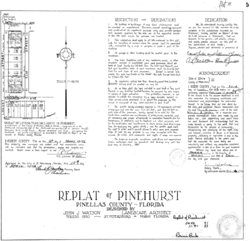- Restrictive covenant
-
This article is about contractual covenants that restrict use of real property. For contractual restrictions on employment, see Non-compete clause.
A restrictive covenant is a type of real covenant, a legal obligation imposed in a deed by the seller upon the buyer of real estate to do or not to do something. Such restrictions frequently "run with the land" and are enforceable on subsequent buyers of the property. In jurisdictions that use the Torrens system of land registration, restrictive covenants are generally registered against title.
Contents
Scope of covenants
Restrictive covenants may arise from many sources, and may be registered against titles or included in leases. Some covenants exist for safety purposes, such as a covenant forbidding the construction of tall buildings in the vicinity of an airport or one restricting the height of fences on corner lots (so as not to interfere with drivers' sight lines). Covenants may restrict everything from the height and size of buildings to the materials used in construction to superficial matters such as paint colour and holiday decorations.
Commercial covenants
Restrictive covenants are commonly registered against commercial properties. General covenants such as those restricting the heights of structures or forbidding certain "dirty" businesses (such as feedlots or chemical production facilities) are common in industrial areas located near residential communities. Developers may seek to restrict the type of business allowed to operate in a certain area so that a purchaser of land in a research park, for example, could not turn the building into a bingo parlour or a tool and die factory. A commercial lease may include a restrictive covenant forbidding the sale of certain items, such as pornography or liquor. A powerful mall tenant (such as a major supermarket chain or other anchor store) may require its landlord to include in its leases to other tenants a restrictive covenant forbidding the sale of certain items (such as fresh meat and produce). The latter situation is more common outside the United States, and is especially seen in Canada.
Residential covenants
Residential covenants are relatively common in the United States. Some residential covenants may be considered generally benign, such as those preventing owners or tenants from removing healthy trees, fundamentally altering historically important structures, or directly harming property values. Others, however, are more detailed. Some restrictive covenants may govern what color a home's exterior is painted, what and how many exterior decorations are allowed, where cars are allowed to be parked, or even who lives in the house (outside of the owner's nuclear family).
Many communities also attempt to forbid amateur radio or outdoor television antennas. Various states in the United States have enacted or are enacting laws forbidding such restrictive covenants and rendering void existing covenants, as amateur radio operators are often seen as essential emergency services.[1]
Controversy
Some have accused homeowners associations of selective enforcement of these rules, making a case only when it is something (or someone) another person dislikes. Breaking a rule, even unintentionally, can bring fines or even a lien on the home. In extreme cases, a homeowners' association may file a lawsuit against an owner who violates the covenants or even foreclose the property.
Attempts have been made to have federal agencies preempt certain restrictive covenants. For example, the American Radio Relay League attempted unsuccessfully to have the FCC pre-empt restrictive covenants related to amateur radio towers. The FCC found that restrictive covenants are private contractual agreements, not state or local regulation, and not subject to the FCC pre-emption policy.[2]
A restrictive covenant differs in the United States from a zoning regulation in that its creation and enforcement is a matter of contract between the landowners whose properties are affected by it, rather than an exercise of the governmental police power. In Canada, governmental authorities may apply both restrictive covenants and zoning regulations to properties. For instance, the city of Calgary's requirement that buildings in the general vicinity of Calgary International Airport be under a certain height is registered against virtually every title in the northeast quadrant of the city as a restrictive covenant, not as a zoning by-law.
Housing segregation
In many cases before the 1960s, these covenants were used for segregationist purposes.[3] A covenant might promise that only members of a certain race would occupy the property. In the case of Shelley v. Kraemer, the United States Supreme Court ruled that it would be unconstitutional for the courts to enforce racially restrictive covenants, and such covenants no longer have any force.
See also
Notes
- ^ State Statutes Incorporating 'PRB-1 like' Legislation, American Radio Relay League (Accessed 9 January 2008)
- ^ Modification and Clarification of Policies and Procedures Governing Siting and Maintenance of Amateur Radio Antennas and Support Structures, and Amendment of Section 97.15 of the Commission’s Rules Governing the Amateur Radio Service, Memorandum Opinion and Order, 17 FCC Rcd 333 (2001), aff'g Order on Reconsideration, 15 FCC Rcd 22151 (WTB 2000), aff'g Order, 14 FCC Rcd 19413 (WTB 1999), recon. dismissed, 17 FCC Rcd 19408 (WTB PSPWD 2002) ("PRB-1 2001")
- ^ The Origins and Diffusion of Racial Restrictive Covenants Michael Jones-Correa Political Science Quarterly, Vol. 115, No. 4 (Winter, 2000–2001), pp. 541–568
References
- J Howell, ‘The Annexation of the Benefit of Covenants to Land’ [2004] Conveyancer 507
- J Martin, ‘Remedies for Breach of Restrictive Covenants’ [1996] Conveyancer 329
- HRW Wade, ‘Covenants – “A Broad and a Reasonable View”’ [1972] Cambridge L J 157.
Categories:- Contract law
- Real property law
- History of racial segregation in the United States
- Urban decay
Wikimedia Foundation. 2010.

